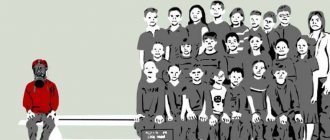Social status is the position occupied by an individual in the hierarchical social system in which he is included (a group, a recognized or alternative social subsystem). This is a person’s social position, connecting with others by defining the laws of interaction (rights and responsibilities, features of interaction and hierarchy of subordination). The status of an individual is determined by characteristics that are specific and important for a given social group: national, age, economic indicators. To a greater extent, social status is determined by external factors and achievements, such as the presence of power, material security, and available opportunities. Much less often, when determining status, a social group focuses on the skills and knowledge of the individual, his internal personal qualities, charisma in communication, and education.
The concept of social status exists solely in the process of comparing the position of one person with the positions of others. It shows a certain place in the hierarchical ladder, reflecting the organization of the social structure. High status makes it possible to influence the course of social and historical development, enjoy privileges, and special location.
The social status of an individual implies not only the use of special benefits, but also imposes on the individual certain obligations that relate to certain activities, expected behavior and compliance with norms prescribed by society. The given social position displayed is supported by strict social mechanisms that not only impose obligations and give rights, but also maintain a certain distribution of people in designated social classes. The level of overall development of society depends on how carefully public social distributions are observed and the compliance of behavioral manifestations with prescribed statuses. The more scrupulously everything complies with the requirements, the less confusion in manifestations, the more highly organized the society is considered.
To determine an individual's social status, one takes into account his level of income, material things included in his property, way of life and lifestyle, interpersonal relationships, position in the system of division of labor, position in the political hierarchy, level of education, innate indicators (nationality, origin, etc.) .d.). Based on these criteria, each individual simultaneously has several social statuses, reflecting the level of each parameter (young man is a social status relative to age, engineer reflects status relative to profession, monopolist shows status based on material property).
But assessing the totality of these categories without taking into account a person’s internal value system will not provide an adequate understanding, since there is a main status based on a person’s self-perception and the lifestyle he adheres to. That is, a person with a noble origin, several higher educations and an intelligent social circle can lead a marginal lifestyle, which will reflect his status.
The concept is quite closely related to the concept of social prestige, which reflects those positions held that are in demand and respected in society. This could be a prestigious profession or area of residence, places visited and education received.
What is social status
A person's position in relation to others is called social status. It depends on a number of signs. Each society dictates its own criteria. Social status gives a person the power that a position in a hierarchical system provides. Also, the role of the individual is dictated by financial savings and the size of property. The social group makes demands on him that explain his responsibilities.
By combining characteristics, we can define social status. This is a place in the hierarchy created in society, depending on the characteristics chosen by it, prescribing to fulfill duties and demand respect for rights.
Concept
Social status is a position in the social structure. The term is used in 2 meanings:
- The social status of an individual is a person’s position in society, in the system of social and interpersonal relations. It is reflected in the internal position (values and orientations, motivations), in external appearance, speech culture, jargon.
- The social status of a group is the place occupied by the group in the social hierarchy. Status groups are characterized by a specific system of values, norms of behavior, a certain lifestyle, type of education and occupation.
The concept includes:
- assessment by an individual or a group of their place in the social hierarchy;
- public assessment of the activities of an individual or group.
Social status is determined by socially significant characteristics :
- natural – ethnic, age, gender;
- economic – property and financial status, lifestyle;
- social settlement – city dwellers, rural residents;
- set of rights, obligations, functions;
- place in the hierarchy of political relations - possession of power, activity in political groups, organizations, movements;
- place in the division of labor system - education, type of employment, profession, qualifications;
- prestige - the social significance of a position occupied in society.
The combination of all these characteristics determines social position . The system of social statuses forms the laws of interaction (rights and obligations, hierarchy of subordination) of individuals and groups.
The difference between social role and status
Social control - what is it, types
Social role is a set of actions that a person must perform in order to follow his status. This is the image that society creates and prescribes to a certain individual, a model of his behavior collected by the environment. His duty is to strictly follow the rules.
Note! Social status can be described as a place, a position, and a role is an action. It is determined by human behavior. The purpose of a role is to correspond to the status that is represented by a certain level.
A company director is a social status that gives him power and the ability to manage the company’s finances. His role is leadership. He must ensure that the rights and responsibilities of employees are respected.
The role of a person in society and the concepts associated with his position are studied in social science. Already at school, children learn how education, family ties and behavior of a person determine his place in life, subsequently providing prosperity and the ability to influence the environment.
Socialization
From birth, a person learns the norms, patterns of behavior and cultural values characteristic of a particular society. This is how socialization occurs and the individual’s social status is acquired. Without socialization, a person cannot become a full-fledged individual. Socialization is influenced by the media, cultural traditions of the people, social institutions (family, school, work collectives, public associations, etc.).
Purposeful socialization occurs as a result of training and upbringing, but the efforts of parents and teachers are adjusted by the street, the economic and political situation in the country, television, the Internet and other factors.
The further development of society depends on the effectiveness of socialization. Children grow up and occupy the status of their parents, taking on certain roles. If the family and the state do not pay enough attention to the upbringing of the younger generation, then degradation and stagnation occur in public life.
Members of society coordinate their behavior with certain standards. These may be prescribed norms (laws, regulations, rules) or unspoken expectations. Any non-compliance with standards is considered a deviation, or deviation. Examples of deviation are drug addiction, prostitution, alcoholism, pedophilia, etc. Deviation can be individual, when one person deviates from the norm, and group (informal groups).
Socialization occurs as a result of two interrelated processes: internalization and social adaptation. A person adapts to social conditions, masters the rules of the game, which are mandatory for all members of society. Over time, norms, values, attitudes, ideas about what is good and what is bad become part of the inner world of the individual.
People are socialized throughout their lives, and at each age stage, statuses are acquired and lost, new roles are learned, conflicts arise and are resolved. This is how personality development occurs.
What does status in society depend on?
Borderline Personality Disorder - What is it?
Position in society is a multifaceted characteristic. Already at birth, a person is assigned to a social stratum, which is determined by his nationality, gender, and race. This is a permanent aspect that is almost impossible to change.
Race
Note! Family and origin influence the role of an individual in the social hierarchy. The peculiarity of the prescribed status is that it is not determined by the desires of a person, he simply becomes its owner.
Throughout life, an individual’s activities and social circle change. Each society or social group gives him rights and responsibilities. He becomes hostage to the expectations of the environment and either lives up to them or not, earning a new social status. It is achieved through one’s own efforts and depends on the level of education, skills, professional qualities, worldview, and the ability to find a common language with others.
Prestige
Not the least role in the destinies of people is played by such a concept as prestige (and positive, from the point of view of the majority, social status). We can easily find examples in the questionnaire that students of all high schools write before entering higher education institutions. They often make their choice based on the prestige of a particular profession. Nowadays, few boys dream of becoming an astronaut or pilot. And once upon a time it was a very popular profession. They choose between lawyers and financiers. This is how time dictates.
Conclusion: a person develops as an individual in the process of mastering different social statuses and roles. The brighter the dynamics, the more adapted to life the individual will become.
What are the social statuses?
Any person has several social statuses. All characteristics form a single image of an individual. The main thing remains the position that gives a person power and depends on his wealth and financial well-being.
The social status that a person is born with is called innate, and determined by family ties is called ascribed. They do not depend on a person’s actions and will appear to him in any case.
Due to differences in birth status, people have different rights, which determines inequality in society, dividing it into classes. Often this affects a person’s adaptability to the surrounding reality, his skills and desire to achieve his goals. People with higher inherent and ascribed status tend to be better off in life. But this does not negate perseverance, hard work and talent, which can change one’s position in the social hierarchy. Skills and abilities acquired through one's own labor are valued more than wealth or manners attributed to family ties.
Innate, assigned and achieved are the main types into which social statuses are usually divided.
The main indicators that determine the place and role in society are:
- Position held: director or leading specialist, head of department, chief accountant;
- Received rank. In the creative profession, this is an Honored or People's Artist. In the service, achievements are determined by military rank: lieutenant or lieutenant colonel. Public sector workers are also noted, for example, an honored teacher;
- Academic degree, for example, bachelor, master, candidate or doctor of science.
master
Note! Status obtained as a result of an individual's merit is considered acquired or achieved. It was created through our own efforts and is a reward for work. The main thing is to set a goal and go towards it, then the acquired status will make you forget about the position assigned to a person from birth.
A person always has unstable statuses, depending on his role in life and circumstances:
- he can be a husband and father of children;
- act as a witness or spectator;
- be a patient or a doctor.
These are all temporary social statuses that are not related to the main thing. Small social groups and an individual’s close circle endow him with certain qualities, creating personal status. It reflects an opinion formed about a person, depending on behavior. There is a concept of group social status, which presupposes belonging to a profession or a nation.
Elderly people are also considered a separate social group. Meanwhile, the status of pensioners varies. It depends on the benefit received, and it, in turn, is determined by the level of income and length of service. High social status is required to ensure a decent income in old age.
Kinds
Each person, as a rule, has not one, but several social statuses. Sociologists distinguish:
- natural status
is the status received by a person at birth (gender, race, nationality). In some cases, birth status may change: the status of a member of the royal family is from birth until the monarchy lasts. - acquired (achieved) status
- a status that a person achieves through his own efforts (position, post). - prescribed (attributed) status
- a status that a person acquires regardless of his desire (age, status in the family); it can change over the course of life. The prescribed status is either innate or acquired.
Basic
Innate is a status assigned to a person from birth, determined by biological factors. It does not depend on a person’s personal qualities and desires. This is gender, nationality, race. For example, Mongoloid characterizes a race. Woman is a characterizing gender. Ukrainians are the defining nationality.
The abdication of the royal family from the throne will lead to the loss of the royal title. In this situation, the inherent status may change.
Prescribed - acquired by an individual, regardless of his desire, but due to a combination of certain circumstances. This could be age, family wealth, blood ties between father and mother, brother and sister. Over time, the prescribed status changes, for example, when a schoolchild reaches the age of majority or the age of retirement.
Achieved - this status is associated with the efforts and zeal of a person, which he made during his life to obtain education, material and non-material benefits. For example, it can be defined:
- title (Miss Russia, labor veteran);
- scientific degree (Doctor of Science, Candidate of Science);
- position (president, leading specialist);
- qualifications (people's teacher, honored master of sports).
Thanks to the achieved status, a lot can be said about a person, about his personal qualities, about the desire to achieve high results and be realized as an individual.
What is status incompatibility?
Status incompatibility is the different position of an individual in social groups. In one society he is in good standing, occupying high positions, enjoying respect and power. Among members of another social group, he is located at the lowest level of the hierarchy. An example is a banker whose social position obliges him to manage thousands of subordinates. They respect him, appreciate him and even fear him. At home, his wife humiliates him in every possible way and does not rely on his opinion. A similar attitude develops in children towards their father.
Spouse disrespect
Additional Information. If a person is stuck in an intermediate position, a prerequisite for the development of marginality arises. This happens when an individual is conditionally in a certain group, but does not accept its values, and exists on the edge. Or he left one society, refusing to obey its orders, but never chose the right one. He lives based on his own norms and rules, trying to combine them with the existing structure of society. This situation is fraught with the development of mental disorders.
Lumpens are another type of people who unsuccessfully left a social group. They lost their position and did not find a new one, finding themselves left behind in life. These are people who are outside of classes and strata of society.
Status incompatibility often arises when a person tries to move up the hierarchy created in society. He breaks away from his friends, changes his social circle, but is not necessarily accepted and appreciated, despite his achievements in the profession. A person grows up the career ladder, while the team does not respect him, but despises him in every possible way. He gets irritated, suffers from this, quarrels with his wife. The spouse, in turn, can also change her attitude towards her partner, based on his behavior: she begins to avoid him, ignores comments, and shows less attention. Thus, the high status provided by the position held is combined with a low position in the team and in the role of husband.
With status incompatibility, an individual does not enjoy the rights given to him in one society while being in another social group. They come into conflict. Deputies, called upon to represent the interests of the people, cannot engage in business and make a profit. Or a short example when a woman wants to combine work and motherhood and cannot perform equally well in both roles. The stereotypical opinion imposes on her the image of a housewife, which she tries to fight. She becomes a successful worker at the expense of time taken away from her family. Accordingly, children and husband experience a lack of attention and care, seeing a tired and exhausted mother and wife in the evenings. The assigned responsibilities cannot be fulfilled at the proper level in both areas. Increasing status in the profession leads to the infringement of household responsibilities, for which there is too little time and energy left, because you have to be at work more and more often.
Tired mom
It is considered incompatible when a person does not live up to the expectations placed on him by society. For example, a goalkeeper is seen drinking alcoholic beverages and smoking. An athlete is perceived as a person who leads a healthy lifestyle, who will not let you down and lives by training.
Note! Incompatibility of statuses causes the individual to suffer. He feels disadvantaged, unable to fully realize himself. Experiences disappointment in his own life, blaming himself or the environment for it.
A state of inadequacy and uncertainty leads to depressive thoughts and social tension that can develop into large-scale conflict. Similar problems are addressed by psychology, aimed at eliminating contradictions, intrapersonal and interpersonal conflicts.
Role set
A role set is understood as a set of roles characteristic of a particular status. Thus, a doctor of science is in the role of a researcher, teacher, mentor, supervisor, consultant, etc. Each role implies its own ways of communicating with others. The same teacher behaves differently with colleagues, students, and the rector of the university.
The concept of “role set” describes the whole variety of social roles inherent in a particular status. No role is strictly assigned to its bearer. For example, one of the spouses remains unemployed and for some time (and perhaps forever) loses the roles of colleague, subordinate, manager, and becomes a housewife (householder).
In many families, social roles are symmetrical: both husband and wife equally act as breadwinners, masters of the house and educators of children. In such a situation, it is important to adhere to the golden mean: excessive passion for one role (company director, businesswoman) leads to a lack of energy and time for others (father, mother).
How to improve your social status
People with low social status are most often aggressive against their environment:
- They take any negative statement personally and try to defend themselves;
- It seems to them that threats await them everywhere, which leads to the development of suspiciousness and anxiety;
- They are unattractive for communication, they have few friends and problems in their personal lives.
It is common for humans to want to improve their social status. You need to start with developing your abilities and professional skills. Only an educated person is able to climb the social ladder. It is necessary to be sociable and pleasant in communication. A person who enjoys power and respect cannot speak rudely using a limited vocabulary. Of course, there are exceptions to this rule. But do not forget about the culture of communication and business etiquette. Appearance must also correspond to status; this is an important link in creating an image. This means you need to understand where you can come in casual clothes, and what event requires you to dress in a formal suit and wear a tie.
It is important to have an example of a successful person before your eyes - someone you want to emulate. He charges you with positivity and motivates you to work. Hard work, perseverance, and ambition will help you reach unprecedented heights. The main thing is to purposefully complete the assigned tasks without being distracted by trifles.
Focus on the goal
Constantly working on yourself, improving your skills, obtaining additional education, and expanding your social circle require a lot of time and effort. Don’t forget about your health, you need to control your diet, diet and give up bad habits. The condition of the body is the key to good health and success in all endeavors.
Ways to change status
When a person's position in society changes, they talk about social mobility:
- Horizontal, when the status is preserved, the personality remains at the same level of the hierarchy. For example, changing citizenship;
- Vertical, in which the individual moves up the social ladder created by society, for example, receives a promotion.
There is another type of change:
- Individual mobility, when a change in status depends on the actions of a particular person. He makes his own way into life;
- Collective mobility involves the transition to a new level in entire groups; it is considered prescribed.
A change in social status occurs within one generation or beyond, when the son of a simple carpenter becomes the director of a metallurgical plant. This type of mobility is called intergenerational mobility. With intragenerational changes, the status concerns one person, for example, a seamstress becomes a chief accountant.
Social status determines the individual’s place in the created hierarchy. Being on the top rungs of the ladder guarantees him power and financial well-being. These are the main characteristics of the main social status. It is bestowed at birth and depends on race, nationality, and family ties. But in modern society, status earned through one’s own labor is much more valuable. When a person, engaged in growth and development, has reached the highest level of power and conscientiously performs the actions of the social role assigned to him.
Notes
- ↑ 12
Shkaratan, 2012, p. 54. - ↑ 12
Shkaratan, 2012, p. 55. - Status (social) // Great Soviet Encyclopedia: [in 30 volumes] / ch. ed. A. M. Prokhorov. — 3rd ed. - M.: Soviet Encyclopedia, 1969-1978.
- Waters, Tony and Dagmar Waters 2021 Are the terms “socio-economic status” and “social status” a warped form of reasoning for Max Weber?” Palgrave Communications 2, Article number: 16002 (2016) Waters, Tony; Waters, Dagmar (2016). “Are the terms “socio-economic status” and “class status” a warped form of reasoning for Max Weber?” Palgrave Communications
.
2
. DOI:10.1057/palcomms.2016.2. - ↑ 1 2 Badaraev D. D.
Social status of a person and the criteria for its determination in modern society // Bulletin of the Buryat State University. — 2009-01-01. - Vol. 5. - ISSN 1994-0866. - Loretta G. Breuning Ph.D. (English). psychologytoday.com
. Sussex Publishers. Access date: June 17, 2021. - Breuning L. G.
Hormones of happiness: How to train the brain to produce serotonin, dopamine, endorphin and oxytocin = Habits of a Happy Brain. Retrain Your Brain to Boost Your Serotonin, Dopamine, Oxytocin. - “Mann, Ivanov and Ferber”, 2021. - 320 p. — ISBN 9785001002376. - How much does it cost to teach a child music here and in the West? (undefined)
.
kultspargalka.ru
. Access date: June 17, 2021. - Love the pianist. According to Putin, Denis Matsuev is worth a hundred million musicians (Russian). mkset.ru
. Information portal “News of Ufa and Bashkiria” (May 19, 2008). Date accessed: October 8, 2021. Archived October 8, 2019.- What will reforms in children's music schools lead to (Russian). rg.ru.
_ Russian newspaper (April 10, 2019). Access date: January 17, 2020.
Pianist Alexey Skanavi: “In China, our classical music is considered a prestigious activity” (unspecified)
. Sibnews (August 13, 2019). Date accessed: September 5, 2019. - What will reforms in children's music schools lead to (Russian). rg.ru.
- Bomb for music schools (undefined)
. Portal ClassicalMusicNews.ru (June 17, 2019). Date accessed: September 5, 2021.- Classics are not in trend: officials suggested that music schools change their format (undefined)
. Portal ClassicalMusicNews.ru (December 22, 2018). Date accessed: September 5, 2021.
- Classics are not in trend: officials suggested that music schools change their format (undefined)
- Medvedev advised teachers complaining about salaries to go into business (undefined)
. Forbes (August 3, 2016). Access date: June 17, 2021. - It was often incorrectly filled out as “employee”, “employee”, “worker”, “worker” or “employees”, etc. In the mid-twentieth century, this column was called differently: “social origin (former class (title) of parents)” . This column could contain the answers “from the peasants”, “from the burghers”, “from the nobles”, “from the merchants”, “from the clergy”, “from the military class”.











